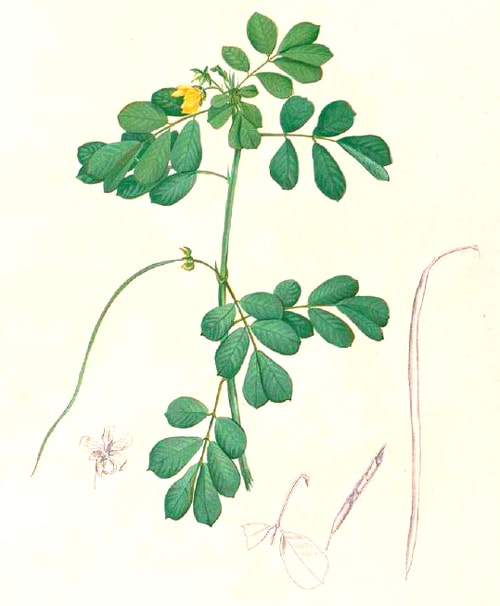Cassia tora, Jue Ming Zi 决明子
Cassia seed, Foetid Cassia seed
Jue Ming Zi (TCM)
Chakramarda (Ayurveda)
Thal ka rdo rje ཐལ་ཀ་རྡོ་རྗེ (Tibetan)
Jue Ming Zi (TCM)
Chakramarda (Ayurveda)
Thal ka rdo rje ཐལ་ཀ་རྡོ་རྗེ (Tibetan)
Cassia tora
Blanco, M., Flora de Filipinas, 1875
Blanco, M., Flora de Filipinas, 1875
Botanical name:
Cassia tora; also used are C. obtusifolia, C. occidentalis, C. sophera
Parts used:
Seed
Temperature & Taste:
Cool, moist. Bitter, Sweet, Salty
Cassia tora; also used are C. obtusifolia, C. occidentalis, C. sophera
Parts used:
Seed
Temperature & Taste:
Cool, moist. Bitter, Sweet, Salty
ADVERTISEMENT:
Uses:
1. Clears Liver Heat, Settles Wind: (TCM)
-Headache with red eyes
-Dizziness, Vertigo, Tinnitus
-Hypertension
-Paralysis and Hemiplegia (as a supporting drug, Ayur. Pharm. India)
-Epilepsy (Tibet)
-a paste of the seeds has been given for Jaundice (Ayurveda)
2. Clears Blood Heat, Settles Wind, Stops Itching: (Ayurveda, Unani, Tibetan)
-much used for skin diseases including Eczema, Psoriasis, Pruritus (Ayurveda, Unani, Tibetan)
-Scabies, Ringworm
-Tibetan Medicine considers it valuable for Lymph disorders (with heat)
3. Clears Heat, Clears the Eyes: (TCM)
-red, swollen, painful, itchy eyes
-photosensitivity, night-blindness
-poor or failing vision
4. Benefits the Kidneys: (Ayurveda, Tibet)
-Spermatorrhea (seeds soaked in water, Ayurveda)
-regarded as Aphrodisiac and used in rejuvenating compounds in Tibetan Medicine
5. Externally:
-leaf or seed in paste are applied to itchy skin diseases
-the seeds steeped in the juice of Euphorbia nerifolia and made into a paste to be applied to cheloid tumors (Chakradatta)
Preparation:
... available in PRO version
Substitute:
... available in PRO version
Dose:
Decoction: 9–15 grams
Powder: 1–3 grams
... available in PRO version
Substitute:
... available in PRO version
Dose:
Decoction: 9–15 grams
Powder: 1–3 grams
Main Combinations:
1. Itchy Skin diseases:
i. skin conditions with Heat, Cassia tora Jue Ming Zi with ... available in PRO version
ii. Cassia tora Jue Ming Zi ... available in PRO version
iii. Cassia tora Jue Ming Zi (6 parts), ... available in PRO version
2. Lymph disorders, Cassia tora Jue Ming Zi with ... available in PRO version
3. For the Heart, to lower Cholesterol and Blood pressure, Cassia tora Jue Ming Zi with ... available in PRO version
4. Dry Bowels or Chronic constipation:
i. Cassia tora Jue Ming Zi with ... available in PRO version
ii. Cassia tora Jue Ming Zi with ... available in PRO version
5. Headache:
i. from Wind-Heat, Cassia tora Jue Ming Zi with ... available in PRO version
ii. Liver Wind-Heat with Dizziness, Cassia tora Jue Ming Zi with ... available in PRO version
6. Eye disorders:
i. from Liver Heat, Cassia tora Jue Ming Zi with ... available in PRO version
ii. strong Liver Heat, Cassia tora Jue Ming Zi with ... available in PRO version
iii. Wind-Heat eye conditions with watering and itchiness, Cassia tora Jue Ming Zi with ... available in PRO version
iv. chronic conditions with deficiency, Cassia tora Jue Ming Zi with ... available in PRO version
7. Hypertension, High Cholesterol:
i. Cassia tora Jue Ming Zi with ... available in PRO version
ii. Cassia tora Jue Ming Zi with ... available in PRO version
Major Formulas:
Nimbadi Churna (Ayurveda)
Catechu 23 (Seng ldeng 23) (Tibetan)
Catechu 25 (Seng ldeng 25) (Tibetan)
Clove 35 (Li shi so lnga) (Tibetan)
Codonopsis 18 (Klu bdud bco brgyad) (Tibetan)
Frankincense 10 (Spos dkar bcu pa) (Tibetan)
Garuda of Camphor (Spos khyung bco lnga) (Tibetan)
Mercury Precious 18 Pill (Dngul chu rin chen bcho brgyad) (Tibetan)
Precious Wish Fulfilling Jewel (Rin chen ratna bsam 'phel) (Tibetan)
Rhinoceros Horn 25 (Bse ru nyer lnga) (Tibetan)
Wish-fulfilling Garuda (Bsam khyung) (Tibetan)
Wish-fulfilling Jewel (Bsam phel nor bu) (Tibetan)
ADVERTISEMENT:
Cautions:
1. Not used in Diarrhea from Spleen deficiency (TCM)
Main Preparations used:
1. Not used in Diarrhea from Spleen deficiency (TCM)
Main Preparations used:
Click the Tabs above for more information on this Medicine
|
'This plant is called by Sanskrit writers Chakramarda, "destroying ringworm," Prapunata or Prapunada, and Uranakska; it has a great reputation in all kinds of skin-diseases. Chnkradatta directs the seeds to be steeped in the juice of Euphorbia neriifulia, and afterwards to be made into a paste with cow's urine as an application to cheloid tumours. He also recommends the seeds together with those of Pongamia glabra as a cure for ringworm. The Arabs call the seeds Ain-es-saratin, or crab's eyes. Under the names of Sanjisaboyah and Sangisaboyah, Mahometan writers give an exact description of this plant, and notice the closing of the leaves at night. They consider the seeds and leaves to have solvent properties in those forms of skin-disease accompanied by induration, such as leprosy, cheloid, psoriasis, &c, and mention their having been used with advantage in plague (waba), a term which is rather indefinite. C. Tora and C. Sophera are named Gallinaria by Rumphius. (Hort. Amb. v., 97, figs. 1, 2.) Ainslie says:— "The mucilaginous and fetid smelling leaves of C. Tora are gently aperient, and are prescribed in the form of decoction; and in doses of about 2 ounces, for such children as suffer from
|
feverish attacks while teething; fried in castor oil they are considered as a good application to foul ulcers. The seeds ground with sour buttermilk are used to ease the irritation of itchy eruptions; and the root, rubbed on a stone with lime juice, is supposed to be one of the best remedies for ringworm. The leaves are also used as a poultice to hasten suppuration. The plant is to be found as a weed in every garden, and is used as a domestic remedy in the manner described by Ainslie. In the Concan the following prescription is used for itch:— Cassia Tora seeds, 6 parts; Psoralia corylifolia seeds, 4 parts; carrot seeds, 2 parts; powder, soak in cow's urine eight days, and apply. Lately the seeds have been recommended as a Coffee-substitute. They are also used as a dye.
In India the young leaves are cooked and eaten on the four Saturdays in the month of Shravan; they are one of the five vegetables particularly acceptable to the gods; the others are Bauhinia malabarica, Amarantus gangeticus, Celosia argentea, and Phalangium tuberosum.' (Pharmacographia Indica, Dymock, 1893) |



